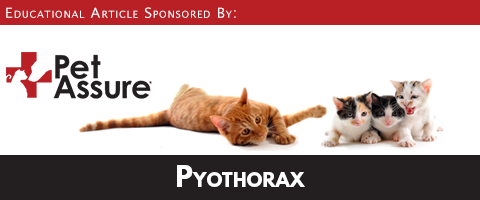Pyothorax is a bacterial infection that causes pus to build up in the chest cavity (the space between the lungs and the ribs). Normally, the chest cavity has the lungs and a small amount of liquid for lubrication. If fluid fills up the entire space, the lungs cannot expand, and your cat will have difficulty breathing. Left untreated, pyothorax is fatal.
CAUSES:
- Wounds to the chest
- Wounds to the esophagus or trachea (usually after ingesting a foreign object)
- A foreign object (for example: a grass seed) entering the body and travelling to the chest cavity
- Infection of the lungs
After any one of these causes, bacteria will enter the chest cavity, resulting in inflammation. Soon the entire space fills with pus.
SIGNS:
- Open-mouthed, labored breathing
- Use of the abdomen to expand the chest
- Fever
- Listlessness
- Lack of appetite
DIAGNOSIS:
To diagnose your cat with pyothorax, your veterinarian may perform the following:
- Examination: listening to your cat’s chest with a stethoscope to check for fluid
- Chest x-rays
- Chest Tap: draining some fluid and studying samples to determine the cause of infection to correctly treat it
TREATMENT:
You must treat pyothorax aggressively. Other, inexpensive treatments will usually not be effective. Treatment consists of:
- Drainage of the infected fluid: Your veterinarian will place tubes into the cat’s chest and pour fluid into its tubes a few times a day to drain out the pus. Your cat will have to stay in the hospital for monitoring of the tubes. Leaving your cat unattended can be very dangerous. If a tube opens, your cat’s chest is open andit won’t be able to breathe
- Antibiotics through IV: Oral antibiotics, or antibiotics without chest drainage, are usually not effective
- Surgery: If chest drainage and antibiotics fail, your veterinarian may suggest surgery to check the chest for foreign objects like sticks, plant seeds, etc.
When the pus has cleared and your cat’s appetite returns, your veterinarian will remove the tubes andsend you home with antibiotics. It is very important to follow your veterinarian’s instructions about the medication. Relapse is possible if the infection is not completely cleared.
PREVENTION:
Although it is not necessarily practical, most veterinarians agree the best preventative measure is refraining from participating in activities that may result in one of the common causes.
PROGNOSIS:
Without proper treatment, pyothorax is fatal. Treatment may be expensive, but generally has a high success rate.
The prognosis depends on the severity of the cause. If the pyothorax is not caused by a serious disease, your cat will have a better chance of healing completely.



